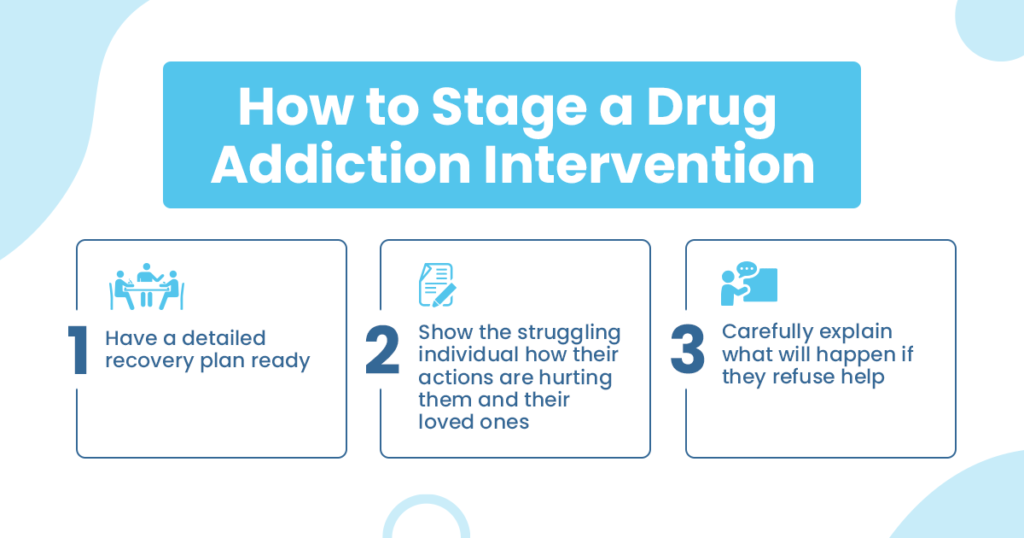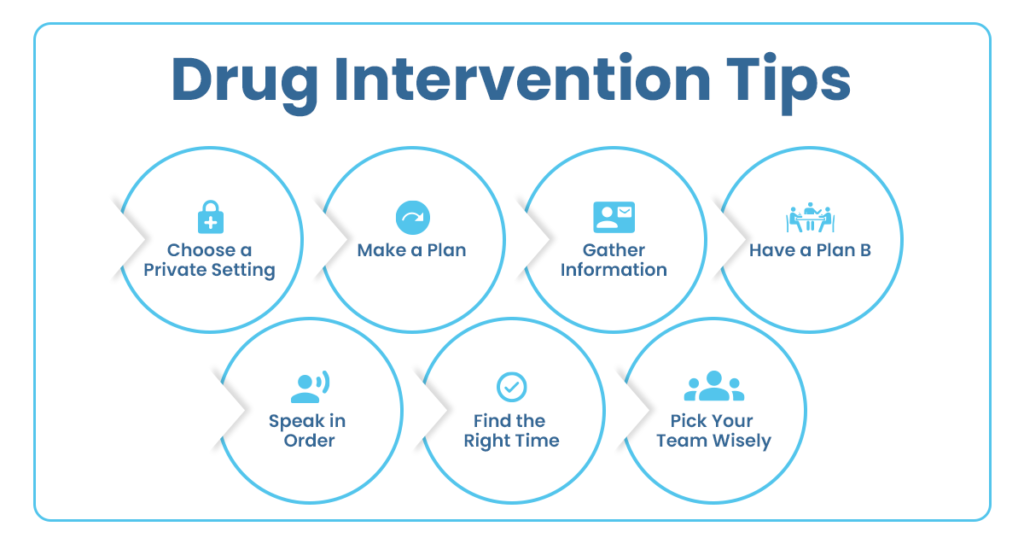
Watching a loved one battle with addiction can be agonizing. Family members and close friends of individuals struggling with addiction sometimes find it challenging to help, especially when the person has difficulty admitting that they need support. The intervention process can be an important first step in addiction recovery.
A formal intervention must be a carefully planned process. It is an important event staged by the family and friends of a person suffering from addiction where they express concern for their loved one. The goal of an intervention is to help them recognize they have a problem, need help, and that resources and support are available to them.
An effective addiction intervention will emphasize the positive sides of an individual’s situation. A person dealing with drug problems must understand that their disease impacts the mental and emotional health of their loved ones.
The objective is not to hold them responsible for the harm they do. Instead, the purpose is to underline that a substance use disorder causes undesirable changes in the person’s behavior and that there is a solution: detox and a comprehensive rehabilitation program.
According to the National Council on Alcoholism and Drug Dependence, around 90 percent of people seek treatment after an intervention. So how can you get the same outcomes? The tips listed below will assist families in constructing an intervention that has the highest likelihood of reaching the individual in need of support.
Form a Plan
Consult a skilled counselor, addiction expert, psychologist, social worker, or mental health during the planning process. These people are familiar with working with addicts and may provide guidance and helpful advice while you arrange the intervention.
There is a significant amount of emotion involved in an intervention, so it’s important to have an experienced third person who can moderate the conversation and keep everyone on course. The first thing you should do is create a detailed plan that highlights when and what each family member, friend, or co-worker says.
Do Your Research & Gather Information
When understanding the nature of addiction, the severity of your loved one’s condition, and the various treatment options is essential. Some individuals are unaware that addiction is a complicated brain disorder that leads to permanent brain alterations. The greater your knowledge of this condition, the more you can help your loved ones find the treatment they need.
Pick Your Team Wisely
An intervention is essentially a therapy session in which the addict’s friends, family, and trusted confidants assemble to convince them to get help. Participants in an experiment should be carefully chosen. This ensures the presence of individuals who have meaningful relationships with the addict.
Those who are not on good terms with the focus individual are advised to leave. This is not the time or place for personal attacks, mending fences, or bringing any private matters to light, so it is essential to pick the right person for the intervention. A motivational talk is an intervention. Only individuals with a willingness to aid and inspire should be welcomed.
It may be best to employ a skilled intervention team at this time. A professional interventionist will support you in picking the right team members, formulating the most effective approach, and enhancing your chances of success.
Finding the Right Time to Talk
You desire to speak with your loved ones while they are sober or at least sober enough to comprehend what is being said to them. It is not a good idea to discuss addiction with someone who is impaired or intoxicated.
Substances impede a person’s capacity to think, react rationally, and completely register and recall what is spoken. Choosing a moment when everyone is sober ensures everyone’s safety since someone who is high or intoxicated is more likely to respond with out-of-control words or actions.
Choose Private & More Formal Setting
No one wants to make an intervention more uncomfortable than it needs to be, but holding one in a loved one’s home can backfire quickly if they can easily go to another room. There are private, more formal places to go, like the doctor’s office, a nearby church, or a recreation center.
Speak in Order
When an addict agrees to treatment, drug and alcohol intervention is done. This infers that the sequencing of the order of speakers’ speeches is essential. Permitting the correct person to speak at the right time will result in a productive and immediate intervention.
If the person struggling with a substance abuse problem has a loving relationship with his or her child, the child will speak first. If the patient and his or her spouse have a close connection, the spouse will speak last, when the patient is most determined and motivated to quit drugs.
Organize Rehearsals
An intervention is usually an emotional event. When participants begin speaking, it is common for them to become emotional and lose their train of thought.
This is why the speaker refers to a prepared piece of paper in many depictions of interventions. Rehearsing your speech beforehand assists you in sticking to the text.
Have a Plan B
Some interventions fall short of expectations and it is important to be prepared for this. For example, if your loved one refuses therapy, you must carry out the corresponding repercussions.
However, what if your loved one rushes out of the room, rants, screams, and uses offensive words?
A backup plan helps you prepare for the worst-case scenario. With so many potential outcomes, it is difficult to predict what may happen to a loved one. However, if you and your intervention group consider backup plans, you will have a strategy for how to respond.
Never Give Up
Not every drug addiction intervention will be effective on the initial attempt. If the person just leaves, do not attempt to stop them physically or provoke an altercation. Simply work with the group to reschedule the event and determine what went wrong.

Frequently Asked Questions (FAQs)
What makes a successful intervention?
According to the Substance Abuse and Mental Health Services Administration (SAMHSA), an intervention has the most potential for effectiveness if the individual is able to comprehend how their addiction puts them in danger.
Again, it is of the utmost importance to emphasize that the intervention for drug use is motivated by care and not by wrath or judgment.
What is the most effective intervention for substance abuse?
Cognitive-behavioral therapy (CBT) is widely regarded as the most effective treatment method for drug and alcohol abusers.
What strategies are used for drug abuse prevention?
The basic strategies used for substance misuse prevention include:
– Information Dissemination
– Prevention Education
– Alternatives
– Problem Identification and Referral
– Community-Based Process
– Environmental Approach
What are the steps usually involved in the treatment of drug abuse?
The basic steps involved in the treatment program for drug abuse include:
– behavioral counseling
– medication
– medical devices and applications used to treat withdrawal symptoms or deliver skills training
– evaluation and treatment for co-occurring mental health issues such as depression and anxiety
– long-term follow-up to prevent relapse
What is the best intervention for addiction?
The most effective intervention is none at all. If you want to show someone you care, invite them on a trip with you. Remember that individuals typically take drugs because they feel alone or believe they can fill a hole in their lives, such as the absence of a person or something.
If someone is unwilling or unable to quit using drugs, they will not. They can be placed in rehabilitation, but as soon as they leave, they will resume substance abuse.
The Haven is Here to Help
Now is the time to intervene if your loved one is exhibiting signs and symptoms of a drug or alcohol addiction that are negatively impacting their life and yours. Early intervention can encourage a loved one to seek a treatment plan and recover from addiction.
At The Haven treatment center, we have a team of drug addiction treatment professionals who can help begin the recovery process to create a positive change in your loved one’s life. We offer a supportive environment with effective treatment programs.
For emotional support and professional help to overcome substance abuse problems, contact us at (561) 328-8627 today!






